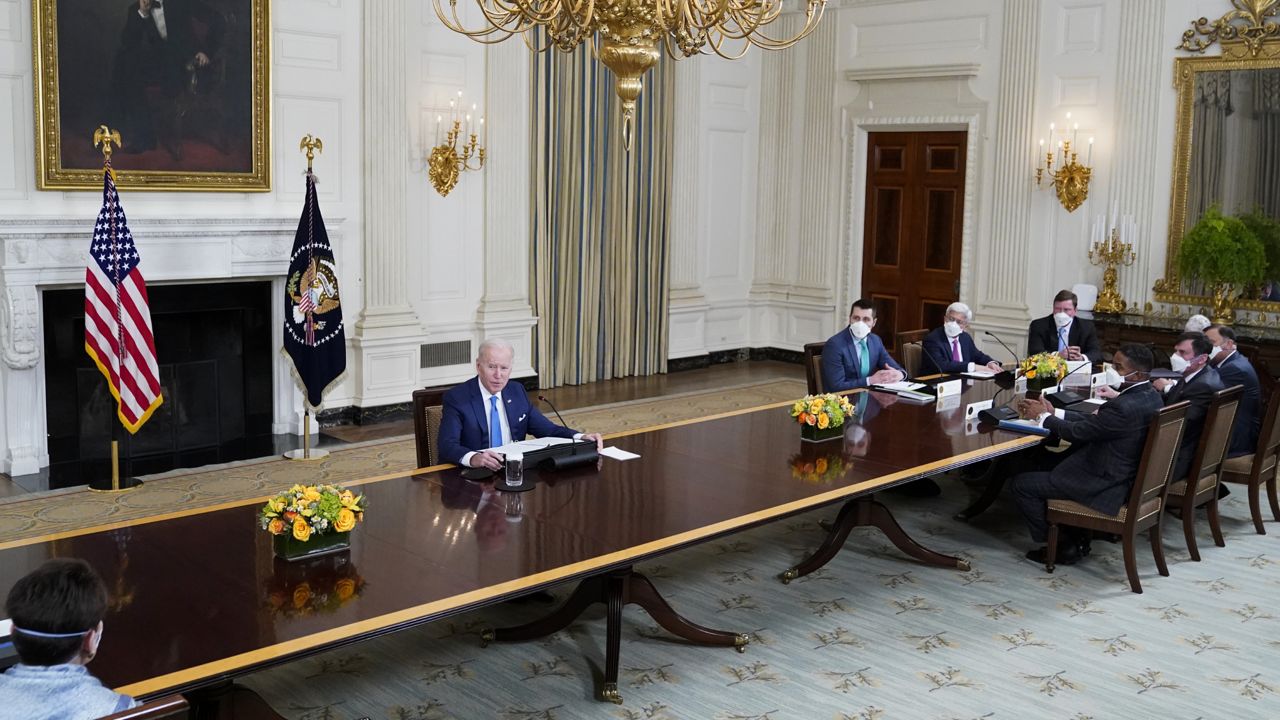President Joe Biden on Wednesday welcomed the leaders of top U.S. electric utility companies to the White House as his administration continues to push for climate-focused aspects of the Build Back Better agenda.
Joining the president in the State Dining Room were Patricia Vincent-Collawn, CEO of of PNM Resources; Pedro Pizarro, president and CEO of Edison International; Nick Akins, chairman, president and CEO of American Electric Power; and Calvin Butler, COO and senior executive vice president of Exelon, as well as energy secretary Jennifer Granholm.
“You have some of the most important jobs in America right now, keeping electricity systems running and running reliably,” Biden told the group at the outset of the meeting. “And I want to thank you for what you're doing to help get the word out about clean energy.”
Several states have seen devastating power outages in recent months due to mostly weather-related events. A winter storm in early February caused hundreds of thousands of power outages and contributed to hundreds of traffic accidents from Texas to Maine.
“I've spent too much time this last year flying in helicopters over areas of scorched earth, because utilities were down, because it was cold,” Biden said Wednesday.
While a sizable chunk of last year’s bipartisan infrastructure law focused on climate resilience – with nearly $65 billion allocated just to bolster the nation’s electrical grid – Biden hopes to increasingly move the U.S. towards a greener economy.
One of the president’s lofty goals is to reach “100% carbon pollution-free electricity by 2035.
The Build Back Better bill includes around $550 billion in funding for energy and climate initiatives, including over $300 billion in expanded tax credits for renewable energy sources.
The group spent much time discussing the benefits of additional clean energy tax credits and to delineate plans for a low-carbon energy system.
“The legislation is going to allow us to be carbon free sooner, gives us renewable portfolio standards, allows us to securitize, to keep costs down for customers,” Vincent-Collawn said during the meeting. “And very importantly, Mr. President, it provides for a just transition.”
Vincent-Collawn added that New Mexico is working to “integrate more electric vehicles into the grid,” a top priority for the president who, a day prior, announced that a new manufacturing plant for electric vehicle chargers will begin production in Tennessee this fall.
Renewable energy credits essentially offer proof that a company used or generated a certain amount of green energy – like solar, wind, hydrogen, etc. – and sent that energy back into the shared power grid.
In a statement released hours before the meeting, Biden said his proposal “includes the largest investment to combat climate change in U.S. history,” adding: “It’ll lower energy costs, create good-paying jobs, and build a clean energy future.”
But Biden’s massive package – which focused mainly on social spending and initiatives to tackle climate change – has stalled in the Senate, thanks largely to moderate Democrat Sen. Joe Manchin of West Virginia.
Manchin, a key holdout and necessary vote to pass legislation in the 50-50 split Senate, in early February said Biden’s Build Back Better bill is effectively "dead."
But the administration continues to press forward with the proposal despite Manchin’s resistance. White House press secretary Jen Psaki on Wednesday suggested that the bill might get a rebrand in the form of a new name, telling reporters the administration is still working with lawmakers "to determine how much of the president's Build Back Better agenda, whatever you call it, can be moved forward."
The Associated Press contributed to this report.
